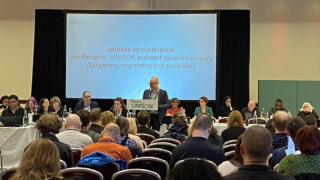Jon Richards: “The proposals could damage cash flow for a number of LGPS funds, affecting workers in local government and services far beyond further and higher education.”
UNISON is warning that government plans to allow universities and colleges in England to opt out of the Local Government Pension Scheme (LGPS) for new non-teaching staff would be bad for staff and a danger to the scheme itself.
Current regulations require so-called post-1992 universities, further education colleges and sixth-form colleges to offer membership of the LGPS to all support staff.
Further education and sixth form colleges, along with former polytechnics, were part of local authorities up until 1992. They became separate employers in that year, but remained as “scheduled bodies” in the pension scheme regulations, legally obliged to offer membership of the scheme to staff not on teaching contracts.
Now Whitehall is consulting on plans to change those regulations and give those employers a choice to give worse pensions to new staff, arguing that they are no longer considered part of the public sector.
UNISON is calling this an “unwarranted and grievous attack on the pension rights of our members”.
“Not providing a decent pension scheme for new staff could lead to a two-tier workforce, with colleagues doing the same job being provided with different pensions provision,” said national secretary Jon Richards.
“Those not in the LGPS would likely end up with far inferior pension provision leading to more public service workers retiring into poverty.
“The proposals risk penalising the lowest paid, mainly female, workforce and could lead to potential discrimination and equal pay issues.”
Because the proposals only apply to England, it would also lead to two-tier pension provision university and college workers between England and the devolved nations: Wales and Northern Ireland, covered by LGPS: and Scotland which has its own separate Scottish LGPS.
Mr Richards, who is vice chair of the LGPS advisory board, also warned that the proposals “could damage cash flow for a number of LGPS funds, affecting workers in local government and services far beyond further and higher education”.
Workers in those two sectors account for 3% of current scheme members, however if these plans were to be extended to similar employers, then up 20% of LGPS membership could be affected.
UNISON is concerned that the whole future of the LGPS could be undermined if there is a significant reduction in new members.
The issue will be debated at this month’s national delegate conference, via an emergency motion submitted by the union’s NEC.
In addition, the union is calling on branches and individual members to respond to the government’s consultation, which runs to 31 July.










